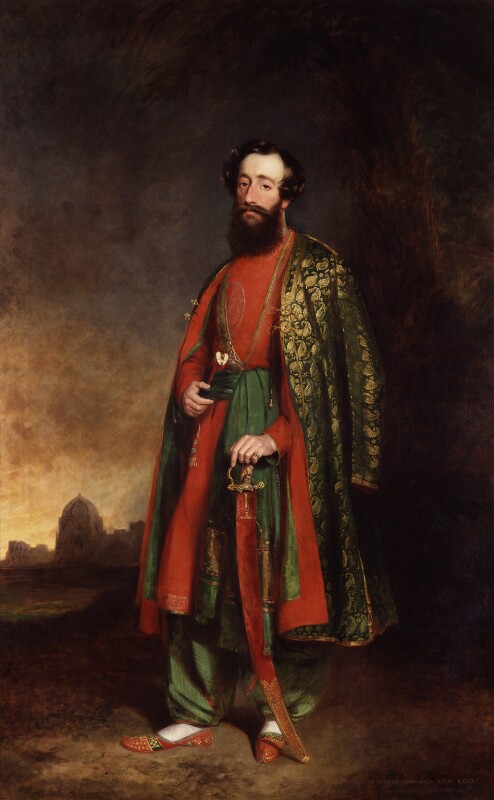
Major-General Sir Herbert Edwardes, by John Henry Foley (1818-74), R. A. 1870. Marble. British Library, Euston Road, London. [Click on all the images to enlarge them,]
This military hero and administrator appears in various articles on the Indian Mutiny. Born in Shropshire and educated at King's College, London, he took with him into his influential military and administrative roles in India a strong Evangelical zeal, and was admired by Ruskin, who extracted passages from his Year on the Punjab Frontier in 1848-49 (published by Richard Bentley in 1851) for his A Knight's Faith of 1885. Patrick Brantlinger describes Ruskin's commentary on Edwardes as "an exercise in Carlylean hero worship" (470). Edwardes College, Peshawar, in Pakistan, a Christian foundation which started as a high school in 1900, is named after him. His bust was bequeathed to the India Office by Lady Edwardes in 1904, and eventually given to the British Library.
Tim Willasey-Wilsey writes that "although a colonialist, Edwardes is still popular in Pakistan where Edwardes College still exists and thrives. He was one of a group of bright young officers who governed the North West Frontier after it was captured from the Sikhs by the East India Company. Another of the group was James Abbot, who gave his name to Abbotabad where Osama Bin Laden was finally tracked down and killed. A third was John Nicholson whose monument still stands on the Grand Trunk Road leading out of Islamabad towards Peshawar." There is also a memorial to Edwardes on the wall of the north transept in Westminster Abbey, which features two angels and a bust of him by William Theed.


Memorial plaque in the chapel of King's College, London, photographed by Tim Willasey-Wilsey. Right: Portrait of Edwardes in native dress by Henry Moseley © National Portrait Gallery, by kind permission. This is an oil painting on canvas, c. 1850, 99 in. x 63 3/4 in. (2515 mm x 1619 mm), which was bequeathed to the National Portrait Gallery by the sitter's widow, Emma (née Sidney), Lady Edwardes, in 1905 (NPG 1391).
The memorial plaque at King's was "ERECTED BY SOME OF HIS CONTEMPORARIES / TO RECORD IN THIS PLACE FOR FUTURE STUDENTS / THE NAME OF A CHRISTIAN SOLDIER AND STATESMAN." He is described as having been "BUOYANT IN DANGER, FERTILE IN RESOURCES, / HUMANE IN VICTORY, WISE IN ADMINISTRATION" and is said to have "COMMANDED THE OBEDIENCE AND WON THE HEARTS" of those he governed."
Links to Related Material
- Chapel of King's College, London
- Edwardes mentioned in the Quarterly Review account of the 1857 uprising in India
[You may use these images without prior permission for any scholarly or educational purpose as long as you (1) credit the photographer and (2) link your document to this URL in a web document or cite it in a print one.]
Bibliography
Brantlinger, Patrick. "A Postindustrial Prelude to Postcolonialism: John Ruskin, William Morris, and Gandhism." Critical Enquirry, 22.33 (Spring 1966): 466-85.
Edwardes College, Peshawar, Pakistan." Web. 16 August 2010.
India Office Select Materials (opening page, British Library site). Web.18 August 2010.
Moreman, T. R. "Edwardes, Sir Herbert Benjamin (1819-1868)." Oxford Dictionary of National Biography. Online ed. 18 August 2010.
Created 18 August 2010
Extended 24 July 2023